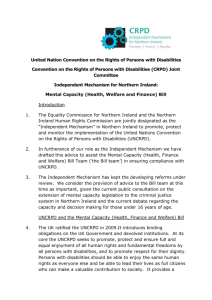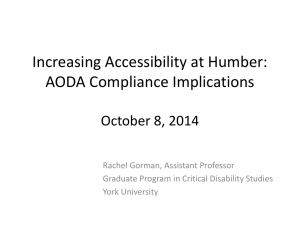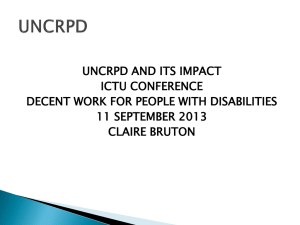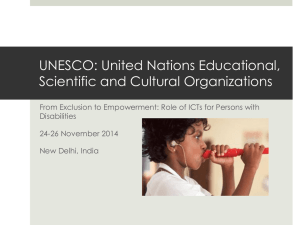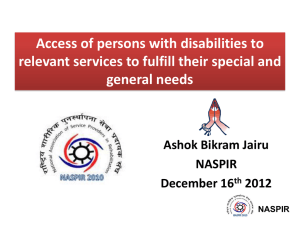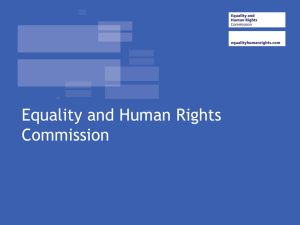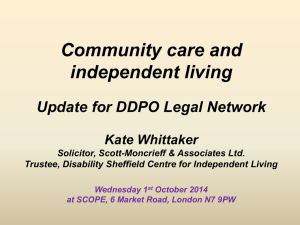UNCRPD for DDPOs -Presentation by Catherine
advertisement
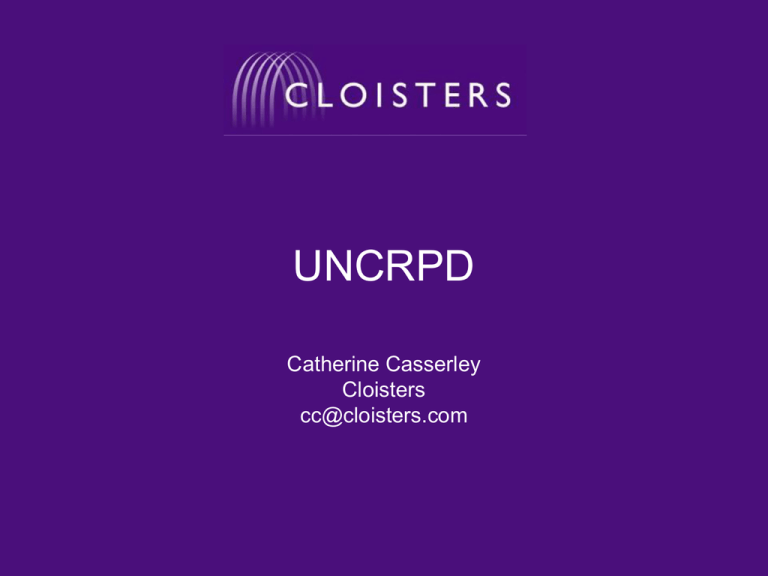
UNCRPD Catherine Casserley Cloisters cc@cloisters.com • • • • • • UNCRPD Background Unprecedented treaty Negotiated in two years Involvement of disabled people Ratified by EU Monitoring mechanisms built in UK signed up to the Optional Protocol UNCRPD Principles • Respect for the inherent dignity, autonomy, including the freedom to make decisions, and independence; • Non-discrimination; • Full and effective participation and inclusion in society; • Respect for difference and acceptance of persons with disabilities as part of human diversity and humanity; • Equality of opportunity; • Accessibility; • Equality between men and women; and • Respect for the evolving capacities of children w • • • • • • • • UNCRPD Convention Rights Equality before the law without discrimination Right to life, liberty and security of the person Equal recognition before the law and legal capacity Freedom from torture Freedom from exploitation, violence and abuse Right to respect physical and mental integrity Freedom of movement and nationality Right to live in the community • • • • • • • • • UNCRPD Convention Rights Freedom of expression and opinion Respect for privacy Respect for home and the family Right to education Right to health Right to work Right to an adequate standard of living Right to participate in political and public life Right to participate in cultural life UNCRPD UK Reservations • Article 18 – immigration (retain ability to refuse entry on e.g. health grounds) • Article 24 – education (special schools – integration) • Article 27 – work/employment: (armed forces) UNCRPD Optional Protocol • • • • • • Admissibility OP ratified Within scope? Any reservations? Within correct time-frame? Within state’s jurisdiction? Consent obtained if acting on behalf of victim? UNCRPD Option Protocol • Abuse of the right of submission? • Has the complaint been examined by another international/regional complaints mechanism? • All effective remedies exhausted? • If not, exception applies? UNCRPD Optional Protocol • Making a complaint • Information concerning the author(s) of the communication • Information concerning the alleged victim(s) • Information on the State party concerned • Subject matter of the communication • Nature of the alleged violation(s) UNCPRD Optional Protocol • • • • • • : Steps taken to exhaust domestic remedies Other international procedures Specific requests/remedies Date, place and signature List of documents attached Address for submission of the communication Decisions of the Committee • HM v Sweden CRPD/C/7/D/3/2011 • Kenneth McAlpine v the UK Communication No. 6/2011 UNCRPD Committee • • • • States reports Within two years of ratification 4 years thereafter Parallel reports Use of the UNCRPD • Policy/campaigning – standards which public authorities should be meeting • Litigation – aid to interpretation (e.g. R (on the application of South West Care Homes Ltd and Others) v Devon County Council and EHRC Intervening [2012] EWHC 2967 (Admin) • Complaints under the Optional protocol mechanism • Shadow reporting Top Tips • familiarise yourselves with the Convention and its articles if you haven't already done so; • Use in lobbying local authorities and in consultation responses; can also be used in Human Rights Act arguments and with the equality duties • where domestic remedies exhausted/no remedy available, think about using the optional protocol UNCRPD QUESTIONS/ DISCUSSION

